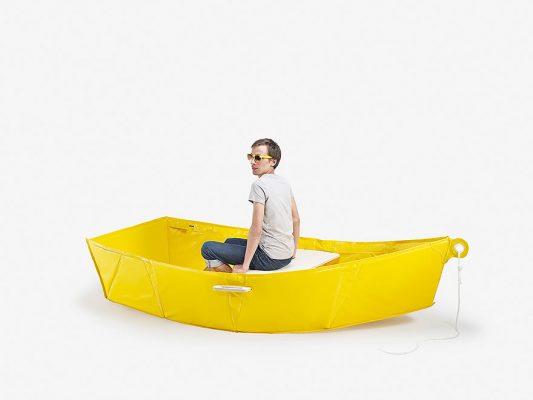ECAL/ Ecole cantonale d’art de Lausanne (Lausanne, Switzerland)

Designer: Thibault Penven
Dimensions: (open) 240cm x 146cm x 40cm, (closed) 110cm x 60cm x 20cm
Tutor: Jörg Boner
Degree: Bachelor Industrial Design
Project Description
Created by Thibault Penven, Ar Vag (which translates as “boat” in Brittany) is a folding vessel with oars intended for use as a shuttle between the shore and a larger vessel. On a lake or in the sea, for a short tour or a fishing trip, Ar Vag is faster than an inflatable dinghy and less cumbersome than a fixed attachment. The hull of the boat consists of a series of fiberglass sheets covered with heat-welded plastic tarpaulin. To set sail, it suffices to simply unfold the thin, light hull of the boat and rigidify it with the central bench, which functions as a keystone, thereby giving the boat its final shape and making it comfortable.
ECAL/ Ecole cantonale d’art de Lausanne (Lausanne, Switzerland)
Located in Switzerland, the ECAL/University of Art and Design Lausanne ranks among the world‘s top ten universities of art and design. The ECAL is a state-funded institution and is proud to have as its only selection criteria the talent and desire for creativity of its applicants.
With around 620 regular students representing over 40 nationalities, it is an international platform for studies across a wide range of creative and artistic disciplines, at both Bachelor’s and Master’s levels.
Our mission at the ECAL is to educate students so that they can achieve their full potential and develop successful careers in their chosen fields. We provide students with in-depth knowledge, challenging experiences and professional input from worldrenowned artists, designers, and practising experts, as well as collaborative ventures with industry and cultural institutions.
We believe strongly that today a university of art and design must not only provide necessary input and knowledge, but also prepare its graduates for successful integration within the professional world. Together with the regular curriculum and activities, we include a large number of collaborative projects, experiments and commissions from national and international companies and cultural institutions. Combined with the ECAL’s strong international presence and its participation in fairs, exhibitions and events, this approach enhances the visibility and value of the work of students.










